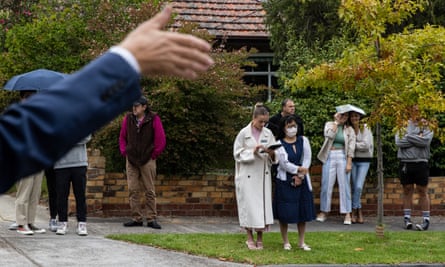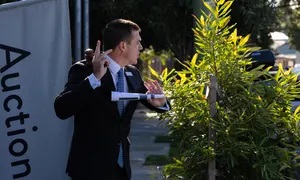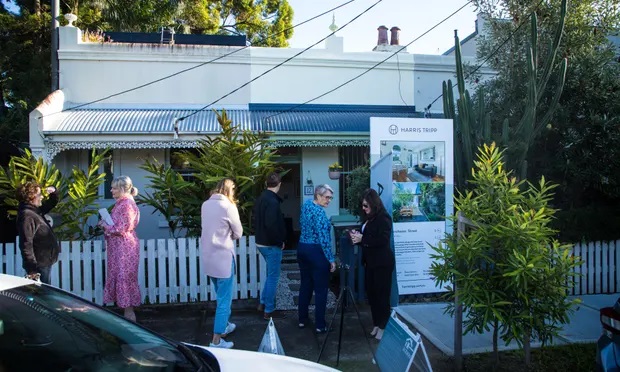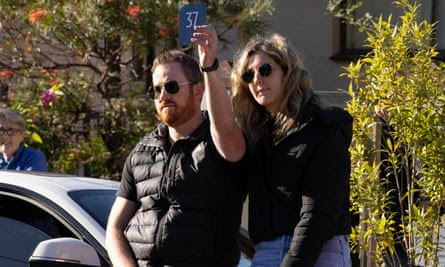Australia'sRealEstateIndustry'sDeceptiveTactics
Australia's Real Estate Industry's Deceptive Tactics
To play the videos on this webpage please click on the
below www.inltv.co.uk link below
AustraliasRealEstateIndustrysDeceptiveTactics (inltv.co.uk)
Click Here for the best range of Amazon Computers
Click Here for INL News Amazon Best Seller Books
Amazon Electronics - Portable Projectors
INLTV Uncensored News
Australia'sRealEstateIndustry'sDeceptiveTactics
Australia's Real Estate Industry's Deceptive Tactics
As a franchisor, you must not engage in misleading and deceptive conduct.
We explain what it is and how to avoid it.

"They need to name and shame agents.." Paul Mulligan Buyers agent knows ‘hundreds of stories’ of people being ripped off in the housing market as a result of agents underquoting on price guides
How can we arrest the rise in white-collar crime in Australia’s property industry?
The INL News Media Group are about to publicly expose and reveal the Australian Real Estate industry's deceptive tactics, and criminal fraudulent behaviour and take formal legal action for fraudulent and deceptive behaviour against various real estate agents and the owner of the domain name and website www.realestate.com.au
WebMar 27, 2023 · Four Corners investigates Australia's real estate market, uncovering the dodgy tactics and regulatory failures that have allowed the market to spiral out of control. More on: Australia Housing Market Up to eight million Latitude Financial customers
Dax Roep and Harcourts Australia

Dax Roep Site & Commercial Specialist
Harcourts Our Team | Harcourts Coastal | Harcourts Australia
https://harcourts.net/au/
An INL News Investigative Report states Harcourts Australia a Freemason controlled real estate group and Dax Roep, a Site & Commercial Specialist with Harcourts Australia, tried to defraud the property owners of a large two story property, by using an auction in various clandestine and wrongful ways, to try and devalue a property to around $200,000 which is now on the market for $2.950,000, and likely to be sold for around $2,500,000 to $2.950,000.
Dax Roep, a Site & Commercial Specialist with Harcourts Australia had a Freemason Brother lined up to purchase the property at a bargain price of around $175,000..
Dax Roep, a Site & Commercial Specialist with Harcourts Australia, and Harcourts Australia, have refused for over 12 months to respond to these provable facts to the INL News Investigation Team
How can we arrest the rise in white-collar crime in Australia’s property industry?
Consumers lose out when a real estate agent acts fraudulently. This includes actions such as false and misleading advertising, deceptive conduct and misappropriation of trust funds.
So what is behind the increase in white-collar crime and fraudulent behaviour? And are there are any preventative measures that could be implemented to reduce the impact on consumers?
The scale of the problem
There are various property agency laws and codes of ethics that set out appropriate standards of behaviour for property agents.
In New South Wales, occupational licensing for property agents and certificates of registration are mandatory if working in the property industry. Occupational licensing for this category is managed under the auspices of individual state and territory Fair Trading offices.
My research concluded that education plays a pivotal role, coupled with industry experience, in combating white-collar crime in the property industry.
From 2003, the NSW regulator diminished the existing higher educational requirements and abolished the need for industry experience. This has been followed by significant increases in consumer and trader complaints in real-estate transactions.
These complaints include non-disclosure of a vested interest, misrepresentation, unethical conduct and fraud.
The table above indicates an increase in complaints from 1756 to 3754 in a decade.
In 2012-13 Fair Trading reported only 1,444 complaints, which represented a decrease of 17.77%. However, there does appear to be an anomaly with the following year, which reported an increase of 113.78%. Therefore, it is possible that the complaints for 2012-13 could have been partly accounted for in the following financial year – hence the disparity.
If this is the situation, then an average calculation would indicate that complaints increased in 2012-13 and 2013-14 by an average of 48% for each year. This appears more in line with trends during the earlier years.
My 2013 study identified ten randomly selected court cases from 2010 to 2013 that related to trust accounting fraud. Of these, five cases disclosed the amounts misappropriated – which totalled A$2,107,261.
I undertook further research on five court cases that occurred during the 2013-14 financial year. The misappropriation of trust funds ranged from $813,936.00 to $1,434,111.43. The penalties ranged from jail sentences, extending from a bond for good behaviour to 18 months’ imprisonment, to disqualification from holding a licence or certificate and working in the property industry.
The way forward
Consumer complaints and trust accounting fraud continue to increase. Over the last decade, the property industry has continuously lobbied the regulator for an improvement in the educational requirements for the certificate of registration and licence categories.
My research developed a model of occupational corruption. Based on this, it recommends the following preventative measures be implemented:
-
A major overview of the educational course curriculum and associated mandated qualifications. All certificate of registration holders should complete a Certificate IV qualification. All licensed holders should complete a diploma qualification, both within the property services training package and the relevant category of employment.
-
An increase in the mandated units and training hours required before starting work in the property industry. The previous industry experience of a minimum of two years should be reintroduced.
-
A points system where agents must submit their business and personal financial details to Fair Trading in order to obtain or renew their property licence. This will identify the agents whose businesses are not trading profitably and who might be considered high risk in trust accounting ethics and processes. The issuing of the licence should be linked back to obtaining a nominated minimum point score that reflects the financial viability of the licence holder or business.
-
An interview system, where agents applying for their licence are required to undertake an oral examination. In Australia, the Australian Property Institute and the Royal Institution of Chartered Surveyors have for decades successfully applied this method of assessment to the valuation profession.
Part of an INL News Investigative Report to be presented to the court which analyses the wrongful, deceptive and illegal tactics used by Auatralian estate agents states the following:
Exposing the Dark Side of Australian Real Estate -The Deceptive Tactics You Need to Know! Part A
Exposing the Dark Side of Australian Real Estate -The Deceptive Tactics You Need to Know! Part B
Four Corners investigates Australia's real estate market - uncovering dodgy tactics and regulatory failures
Australia's Real Estate Industry's Deceptive Tactics
Australia has over $9 trillion in real estate transactions every year, so real estate agents and advertising groups are fighting for their share in the massive yearly profits in Australia has over $9 trillion in real estate transactions every year.
Experts warning about outdated approach to tame inflation - 60 Minutes
Underquoting in Australian real estate industry is leaving buyers feeling betrayed
The only thing that will stop practice of underquoting on price guides is to ‘name and shame’ those caught doing it, says one buyers agent

Buyers agent Paul Mulligan knows ‘hundreds of stories’ of people being ripped off in the housing market as a result of agents underquoting on price guides
When Sarah* (not her real name) stumbled upon her dream two-bedroom apartment in the eastern Sydney suburb of Edgecliff, she was hopeful she’d finally found something within her budget.
But at the inspection, the real estate agent immediately asked if she could stretch her price range. “They said it was listed for $1.1m because they wanted $1.2m, $1.3m,” she said.
“I was like ‘are you joking?’ It’s so demoralising.”
Sarah has visited almost three dozen properties in six months, and now instinctively questions every market price in case the agent is underquoting.
“I don’t want to waste my time getting emotionally invested, then have them say no,” she says. “You’ll often receive something in five days saying the price guide has been revised by $150,000. It’s pretty depressing.”
Real estate bodies have said underquoting remains “endemic” due to poorly regulated and underpoliced regulations.
The practice refers to posting listing prices substantially below market value in order to artificially attract more prospective buyers. And while it’s commonly identified as a symptom of buoyant markets, in falling markets it can make it even more difficult for buyers to estimate the real value of the property.
In May last year, NSW Fair Trading established a dedicated underquoting team to address “rising concerns” about the practice.
Since then, there have been 161 penalty infringement notices issued for underquoting and related offences. Each case was fined $2,200.
Agents in Sydney usually charge a commission of about 2% on sales , meaning the revenue on a median house price in the city of $1.6m would be about $32,000.
In 2020, 55 penalty notices were issued – including 25 issued after the underquoting team was established – from a total of 200 complaints.
“NSW laws regulating real estate agents have robust protections against misrepresentations about estimated selling prices and underquoting practices,” a spokesperson said.
Buyers agent Paul Mulligan says the regulations “aren’t effective, because it’s still happening”.
“[The fines] are nothing,” he says. “They need to name and shame agents. That’s the only thing that’ll change things.”
Mulligan says he could “write a book” on the “hundreds of stories” of people being ripped off during his time in the industry, citing price discrepancies of as much as $500,000.
“Frustrated buyers are just fed up, they’re at a huge risk of making a big mistake,” he says.
Waqas Khawaja estimates he and his partner experienced underquoting half a dozen times at auctions across Sydney until finally securing a property in the south-west.
“You don’t realise what’s happened until you lose an auction by a quarter of a million,” he says.
“It’s gutting initially because as a first homebuyer, you make the emotional mistake of getting attached to a property.
“Realising that you never had a chance feels like a betrayal.”
Southern discomfort
Buyers advocate David Morrell says underquoting is even worse in Victoria, the “auction capital” of Australia.
From 1 July 2021 to 31 July 2022, Consumer Affairs Victoria (CAV) recorded 1,466 underquoting inquiries and complaints. During the same period, just 48 infringements and 171 official warnings were laid.
A spokesperson for Consumer Affairs Victoria said underquoting was “taken very seriously”. “Agencies found doing the wrong thing face penalties of more than $36,000 and a loss of sales commissions,” they said.
“Consumer Affairs Victoria undertakes year-round compliance activity, which includes auction monitoring, inspections, and investigating where necessary.”
But Morrell estimates 70% to 80% of properties in Victoria are underquoted.
In 2003, he became the first person to make a complaint for alleged underquoting to the Australian Competition and Consumer Commission (ACCC).
The Melbourne real estate agent was later found to have engaged in misleading or deceptive conduct by advertising prices of “600,000-plus” then “650,000-plus” for a house passed in at auction at $780,000. No penalty was laid.
“It’s an endemic part of the real estate practice,” he says. “People have been travelling three to four hours and the price is $400,000 more than they expected.
“It’s misleading, it’s a fraud on purchasers. And until significant penalties are handed out, regulations have been ineffective … if one does it, others have to follow.”
The first underquoting law was issued in New South Wales in 2016, requiring the listing prices of residential property sales to align with market values or sellers’ valuations and cracking down on vague formats of listing prices like “600,000 and above”.
A year later, a similar law rolled out in Victoria.
A 2021 University of Melbourne study found the introduction of underquoting laws worked to align listing prices with market values, leading to a relative drop in auction sales prices of between 2% and 6% by cracking down on overbidding.
But Morrell said the laws had done little to dissuade estate agents and were rarely policed.
“There’s been underquoting of millions,” he says.
“I had one private sale listed at seven million, my buyer offered seven and they came back and said ‘the owner wants 8.8, she changed her mind’. It’s just rubbish … the grubby part of real estate that gets rubbed under the carpet.”

Prospective buyers at a property auction in Melbourne, the so-called ‘auction capital of Australia
No disincentive
Scott Aggett left residential sales in 2015, “disgruntled” after two decades in the industry. He’s since founded Hello Haus, a national negotiation service.
“I felt there was a better way to service buyers than the bullshit that went on,” he says. “I couldn’t take all that game playing … as an agent, I didn’t feel I could win unless I was lying.
“Nobody was coming to my open house for inspections because I was giving them the real prices, and it’s still rife in 2022.”
Hello Haus research found it takes an average of seven months for Australians to buy a property, with 45% of people reporting buyer remorse.
“Buyers spend 90 hours of their time [looking], inspect 300 properties, miss five times and on sixth the compromise and overpay,” Aggett says.
“Last week I had an agent who said openly … ‘we tell the owners if we quote within the 10% range we will have zero people through the open home’.
“They’re quoting up to 30% less to generate interest. The goal is to drive as much traffic to the property as you can to create competition and then drive that north. That’s openly being discussed.”
Last week, Aggett bought a property for a client at $3.75m, quoted at $3.2m.
“That’s consistent with what I have to deal with,” he says. “It’s a shitshow … and this happens every day across Australia.”
Aggett says fining estate agents $2,200 in NSW is little disincentive when commission will often be at least $30,000.
“They need to take entire fee off [the] agent … and agents need to have a strike-out policy,” he says. They should also openly disclose the agency agreement price. But it doesn’t seem to be on the cards at the moment, and it’s been going on for decades.”
The Real Estate Institute of Victoria (REIV) has lodged a submission to Consumer Affairs Victoria advocating for transparency reforms, including enhancing compulsory Statement of Information which estimates pricing for all residential properties.
“Part of what we’ve been pushing for … is to have regulation around pricing based on evidence,” the REIV’ chief executive, Quentin Kilian, says.
“At least then the buyer can say OK, it’s not comparative but here’s rationale. Real estate markets are so diverse, they move differently and have different pressures. You can’t have a one size fits all.”
Kilian says as the market begins to settle he expects to see “less discrepancies” in price estimates. But he maintains underquoting isn’t as common “as people would like to think”.
“It does occur from time to time,” he says.
“But in a really buoyant market it can often be simply the price has moved in the time it was first listed or the market has gotten excitable at an auction and it goes well beyond expectations.”
As a Real Estate Agent, Am I Engaging in Misleading and Deceptive Conduct? By Christopher Tran Tran Law Graduate
As a Real Estate Agent, Am I Engaging in Misleading and Deceptive Conduct?
‘It’s been hell’: underquoting in hot housing market frustrates young buyers
Prospective buyers increasingly complain that price guide underquoting is rife as Sydney property prices skyrocket

A Guardian Australia analysis showed 29 out of 43 properties sold for above the price guide
Every three or four weeks, the neighbours say, the scene is the same. It is a cold Saturday morning in Dulwich Hill in Sydney’s inner west, and dozens of hopeful buyers have turned out for an auction. It’s a two-bedroom house on a nice street, near the park. The price guide is $1.25m. The street is full, and every one is wary.

Prospective buyers line up at 12 Manchester Street in Dulwich Hill Price guide $1.2m sold for $1.36m.
Michael and Tom, a young couple, are there – along with Michael’s family for support. They say that house hunting is “hell”.
“You could write 20 pages on the young people [who can’t get into the market],” Michael’s mum tells Guardian Australia.
“One auction last weekend went for about $400,000 above [the price guide],” Michael says. “So, it’s been hell. Pre-approval takes forever now. And it’s just, well, the guides are ridiculously low. For every property. Every property.”
As Sydney’s property prices skyrocket, rising a record 8.5% in only the past three months, prospective buyers increasingly complain that price guide underquoting is rife in the industry.
A Guardian Australia analysis of recent property sales found that 29 out of 30 Sydney properties that sold for a publicly disclosed price between 8 May and 22 May sold for more than their price guide – including two that sold for $600,000 above.
Underquoting is a breach of the Property Stock and Business Agents Act, but is notoriously difficult to prove, especially in a surging market. Underquoting occurs when agent knowingly provides a price guide that is lower than their estimated selling price, fails to amend an estimated selling price after recent offers or recent comparable sales, or does not provide a “reasonable” guide based on the market.
According to New South Wales Fair Trading, there have been 146 complaints of underquoting since the start of 2021, and only 27 real estate agents have been fined or otherwise disciplined for underquoting.
Over three weeks, Guardian Australia obtained price guides for 43 properties in Sydney set for auction this month – spread across the city’s east, inner west, west and north.
Thirty properties were sold for a disclosed price, and all of them except one sold for over the price guide.
One house in Sydney’s inner west sold for $625,000 over the price guide, and another sold for $600,000 above. Other houses sold for $420,000, $360,000, $330,000 and $291,000 above the guides.
The smallest gap between the guide and result was $25,000, for a three-bedroom penthouse in Parramatta.
It is just almost impossible says Michael centre. "They need to name and shame agents. ".. Paul Mulligan Buyers agent
‘We’re shut out of the market’
At the auction in Dulwich Hill on Saturday, multiple bidders tell Guardian Australia that underquoting was routine in the market.
Michael and Tom say frequent underquoting costs them money, as they spend on condition reports and legal work in preparation for an auction, only for the first bid to break the price guide.
“For this place, just the building report was $150,” Michael says.
“We’ve gone to a bunch of places where it is $400 for a building report,” Tom adds.
“You could easily spend $1,000 a weekend just looking at building reports of places you look at,” Michael says. “It is just almost impossible. And now also my Hecs debt now counts as a debt. Which it didn’t before pre-Covid.
“Young people – and we’re not particularly young – we’re shut out of the market,” he says. “I am turning 32.”
“We’ve been saving for a very long time,” Tom says. “I started probably seven or eight years ago,” Michael says. “And it’s not even enough if mum and dad weren’t helping.”
Another pair, Andrew and his partner, are also there. They’re bidders, but they’re hanging on the sidelines. They are buying for a second house as an investment property. They too, are furious at agents for underquoting.
“Nah, it’s never been hitting the price guide ever,” Andrew says. “It is always over the price guide.
“Whatever we get, we always put $300,000 on top of it. We went to one the other day that went up over $450,000 over the price guide”. That one, he says, was a house listed at $800,000.
His partner jumps in. “We made complaints about that,” she says.
“It is just almost impossible,” says Michael, centre.
“It is always over the price guide,” says Andrew, left

It is always over the price guide says Andrew left.
Then the auction starts. Outside the front of the house – which shares a common wall with two others – the bidders fan out across the road. Neighbours come out into their yards, and dogwalkers pause to watch the action.
The auctioneer suggests the first bid should be $1.25m – the exact price guide.
“It is a terrific home and it’s in a fantastic location, and it’s here to be sold,” he yells into the morning. “I hand it over to you…for a fair and reasonable start here this morning. Call out a number, suggest a figure”. There is a tense silence.
“I would have thought something around the $1.25m to kick us off here today,” he says. “[The agent] has kept you well informed throughout the course of the campaign.”
Andrew, leaning up against his car, starts the bidding below that. At $1.2m.
The auctioneer casts around the crowd. “Buyers, let’s move forward,” he says. “Naturally with the 50 [to $1.25m] or take me straight to $1.3m, for a play for the keys”.
A young woman in a striped jumper, Alex, bids in at $1.220m. A few minutes later, the third bid comes, and it is from Michael and Tom. They are in at $1.25m.
$1.26m comes from Alex, and $1.27m comes in from Andrew. All three trade bids, moving up small increments. The auctioneer is calling for them to go higher. “It’s only a number,” he says at $1.3m. “Let’s surpass it”.
It now a war between Michael and Tom, and the woman in the jumper, Alex. Michael and Tom bid at $1.351m. The auctioneer tells them off. “Don’t get caught into the lower denominations, sir, it will just cost you more in the long run….60 or 70, do the knockout punch.”
But the young couple nearly have it. It gets to two calls, and a long pause. Then Alex is back, at nearly the last moment, at $1.36m.
The agent turns to Tom and Michael, who are shaking their heads. “Are you absolutely sure?” he says. “Are you sure?” He offers them the most alluring thing he can. “No more real estate shopping,” he says. “You get your weekends back.”
They look torn. But they don’t bid. The property goes to Alex.
“I’m happy,” she tells Guardian Australia. Then she amends that. “I’m relieved.”
“I’ve been looking, I don’t even want to tell you how long. It’s embarrassing.”
Asked whether she is pleased with the result – only $110,000 above the price guide – she says yes.
“I have seen places sell for $500,000 above the guide. And it’s ridiculous, because you pay your solicitor, your pest report. You invest your time. But you were never in the running.”
Her mother also jumps in. “It’s not accurate. Not normally. Today was the exception to the rule.”
“That’s the first time,” Alex says.
As the dust settles, a neighbour has wandered out to her front lawn to observe the festivities. She tells Guardian Australia three houses on this street have all recently sold “for quite a high price”.
“I’m happy for our neighbours,” she says. She drops her voice to a whisper: “It’s a lot of money, but it’s what people are willing to pay”.
Michael meanwhile, is sanguine about losing.
He says the house needed about $200,000 of extra work, meaning the real cost is more like $1.55m.
“Look to be honest, it’s not freestanding,” he says. “There’s a lot that needs to be done. The floors are sinking. It was going to be a money pit. And from what I have seen, you only really go higher than one and a half [million] if it’s a freestanding house.”
He sighs. “I’m disappointed because we want to get into the market. And Dulwich Hill would be great, and that was probably one of the only opportunities. But it would probably cost $200,000 just to renovate, to make it actually liveable. I don’t think it was worth that”.
He then holds up his phone. The calendar is a wall of appointments for more house inspections. “That’s our schedule”. His partner Tom is already in the car, engine running, the door is open.
“Our day is pretty booked up, to be honest,” says Tom from the car.
“90% of them we won’t get anyway,” says Michael.
Underquoting allegations skyrocket
Out of all 43 properties analysed by Guardian Australia, 29 sold for above the price guide, one sold for below the guide, four sold for an undisclosed price, and nine were either withdrawn, rescheduled or otherwise not disclosed.
Of the 30 properties that sold for a disclosed price, all of them except one sold for over the price guide.
The one that sold for below the guide was only $15,000 short. The two-bedroom apartment in Sydney’s east sold for $1.085m and had a price guide of $1.1m.
In total, 12 houses sold for $250,000 or more above the quote – all, except two, in the inner west.
One three-bedroom house in Tempe sold for $600,000 above, and two properties in Dulwich Hill sold for $360,000 and $291,000 above the guide. One two-bedroom house in Leichhardt sold for $330,000 above.
In Sydney’s north and west, fewer houses were sold, and they sold much closer to the price guide. Multiple houses passed in or were withdrawn.
Tim McKibbin, the chief executive officer of the Real Estate Institute of NSW, said underquoting was unacceptable, but that providing accurate guides was difficult when the market surges sharply.
“There are people in every trade or calling or profession that do the wrong thing and bring their profession into disrepute,” he said. “And every organisation that has them certainly wishes they didn’t. But they do. And we have ours.”
McKibbin said that agents had a duty to revise their price guides based on offers from buyers, and from recent sales in the market.
Underquoting occurs when an agent fails to provide or revise a reasonable estimated selling price, based on offers or market sales of similar properties. It does not legally occur when a house sells over the price guide.
McKibbin said the frenzy of the market had a role.
“The data shows that in hot markets, the allegations of underquoting skyrocket,” he said. “Yet when Fair Trading investigates them, the vast majority are not underquoting at all.”
“I think the market right now is cooling...I suspect allegations of underquoting will drop.”
McKibbin said the sharp price rises were due to returning Australians and low interest rates.
“We have lost immigration of about 150,000 people, however we have got 500,000 people who have come back from overseas, and they are still coming. Those people are coming back looking for a house.
“I have a lot of sympathy for people. Because I have been there myself. You spend your Saturdays, and it’s the same old thing, week in week out ... You go and do your due diligence, and then you go to the auction and the price goes somewhere that nobody thought it was going to go. That is very upsetting.”
Joe Farr and Joe Farr's Platinum Properties Real Estate Gold Coast Queensland Fraud Gang
JoeFarrPlatinumPropertiesFraudGang (inltv.co.uk)

Joe Farr : A smooth talking con man sharpshooter real estate agent from the USA who operates at Joe Farr Platinum Properties 7/130 Scarborough Street Southport QLD 4215
Tel: 07 5500 7000
Joe Farr
Mob: 0422400680
Email: "Joe Farr" <This email address is being protected from spambots. You need JavaScript enabled to view it.>
"Joe Farr" <This email address is being protected from spambots. You need JavaScript enabled to view it.>
"Jennifer Farr" <This email address is being protected from spambots. You need JavaScript enabled to view it..a
"Dianne McMaster" <This email address is being protected from spambots. You need JavaScript enabled to view it.
"Sarah Welsh" <This email address is being protected from spambots. You need JavaScript enabled to view it.>
"Peter Arias" <This email address is being protected from spambots. You need JavaScript enabled to view it.>
"Garry O'brien" <This email address is being protected from spambots. You need JavaScript enabled to view it..a
"Michael Conrick" <This email address is being protected from spambots. You need JavaScript enabled to view it.
"Peter Ryan" <This email address is being protected from spambots. You need JavaScript enabled to view it.>
Plantinum Properties Real Estate
Email: This email address is being protected from spambots. You need JavaScript enabled to view it.
Email: This email address is being protected from spambots. You need JavaScript enabled to view it.
Email: This email address is being protected from spambots. You need JavaScript enabled to view it.
Email: This email address is being protected from spambots. You need JavaScript enabled to view it.
Email: This email address is being protected from spambots. You need JavaScript enabled to view it.
Email: This email address is being protected from spambots. You need JavaScript enabled to view it..
Email: This email address is being protected from spambots. You need JavaScript enabled to view it..
Email: This email address is being protected from spambots. You need JavaScript enabled to view it.
Joe Farr Platinum Properties
7/130 Scarborough Street Southport QLD 4215 [3]
Tel: 07 5500 7000
Email: This email address is being protected from spambots. You need JavaScript enabled to view it.
https://www.platinumre.com.au/
https://www.platinumre.com.au/
Joe Farr and Joe Farr's Platinum Properties Real Estate Gold Coast Queensland Fraud Gang

If you are looking to obtain the lowest possible sale price for your Queensland Property ring Joe Farr and Joe Farr's Platinum Properties Real Estate Gold Coast Queensland Fraud Gang...
Joe Farr and Joe Farr's Platinum Properties Real Estate Gold Coast Queensland Fraud Gang will get you a quick sale of your property at 10% to 20 % of your property's true achievable sale price ...
Joe Farr and Joe Farr's Platinum Properties Real Estate Gold Coast Queensland Fraud Gang will just ring one their silent investor partners or one of drug dealing mates to purchase your property at 10% to 20 % of your property's true achievable sale price ... the they will on sell your property at the full achievable market price and make an extra few million profit.. to spilt with person who brought your property at 10% to 20 % of your property's true achievable sale price .and Joe Farr and Joe Farr's Platinum Properties Real Estate Gold Coast Queensland Fraud Gang ..

"Everything is 'Freedom of the Press' with you !..."

"We offer the same service as large firms, but our overheads are lower.."
Real estate agents and insiders expose the secret tactics used to lure buyers and sellers - ABC News
Australia's residential property market is worth more than $9 trillion.(Four Corners)
If you are fortunate enough to try to enter Australia's property market, you have come across its gatekeepers – real estate agents.
You may have suspected price guides were being lowballed, been promised the world by an agent, or felt like you were outright misled.
Four Corners has spoken to more than 100 people — real estate agents, property professionals, buyers and sellers — as part of a crowdsourced investigation into the sector.
These insiders have lifted the veil of secrecy that hangs over how the industry works.
Here are the tactics agents use, the limits to regulation, and the pitfalls you should avoid.
Underquoting: 'It's everywhere … it's really blatant'
One of the most common concerns of buyers is underquoting — agents listing a property with an unrealistically low price guide to lure them in.
Would-be purchasers can spend thousands of dollars on property inspections and lawyers, only to find they never had a shot at getting it within their budget.
Some agents, like Sydney's Mark Jones, said the practice was widespread.
"It's everywhere, and it's obvious; it's really blatant," he said.
"Anyone who's in the industry or anyone who's trying to buy a property, certainly in the eastern suburbs of Sydney, can see it on listings."
Mark Jones says underquoting is widespread.(Four Corners)
Mr Jones said he regularly saw price guides listed for 20–30 per cent below what the property actually sells for.
Occasionally, those price guides are even below what properties have previously sold for — a major red flag.
He characterised the industry as "extremely insincere".
"It's lies on top of lies. A lot of people get hurt in the process. There are a lot of people who waste money."
Melbourne agent Zed Nasheet said "underquoters" give real estate agents a bad name.
"The amount of buyers that show up to auctions in today's environment, where agents have underquoted … they market a house between $2.4 — $2.6 [million] where they've [got a] reserve price of $3 million. The buyers get pissed off.
"They need to change their ways."
Underquoting is broadly prohibited in all jurisdictions if it amounts to false or misleading conduct under Australian consumer law.
Australia's residential property market is worth more than $9 trillion.(Four Corners)
In NSW and Victoria, there are also specific offences for underquoting. Agents must keep a record of comparable sales they've used to provide a price estimate.
But Mr Jones said some agents gamed the system by creating a trail of paperwork designed to mislead the regulator.
"There's no standard property, so you can always pick whatever properties you like to basically fudge the data any way you like, up or down," Mr Jones said.
"It's very easy to manipulate the data to suit the narrative."
There were only five prosecutions against agents in NSW in 2022, and none were for underquoting.
Real Estate Institute of New South Wales CEO Tim McKibbin said it showed that most agents were doing the right thing.
"I'm aware it does take place, but having said that, I don't think it is anywhere near as big a problem as what the community would believe it to be," he said.
Secret commissions and referral fees
Real estate industry professionals regularly refer clients to different services. What you might not know is on some of these occasions, money changes hands simply for the service of dropping a name.
Mr Jones said it was standard for referral fees to be paid to anyone who brings an agent a listing or a lead — if it results in a sale, it can be 20 per cent.
"Buyer's agents are referring their clients to selling agents, selling agents are referring clients to buyer's agents. Same thing with financial planners, accountants," he said.
"It's all considered very normal, which I don't have a problem with as long as it's disclosed."
Mr Jones said he regularly saw price guides listed for 20–30 per cent below what the property actually sells for.
Occasionally, those price guides are even below what properties have previously sold for — a major red flag.
He characterised the industry as "extremely insincere".
"It's lies on top of lies. A lot of people get hurt in the process. There are a lot of people who waste money."
Melbourne agent Zed Nasheet said "underquoters" give real estate agents a bad name.
"The amount of buyers that show up to auctions in today's environment, where agents have underquoted … they market a house between $2.4 — $2.6 [million] where they've [got a] reserve price of $3 million. The buyers get pissed off.
"They need to change their ways."
Underquoting is broadly prohibited in all jurisdictions if it amounts to false or misleading conduct under Australian consumer law.
In NSW and Victoria, there are also specific offences for underquoting. Agents must keep a record of comparable sales they've used to provide a price estimate.
But Mr Jones said some agents gamed the system by creating a trail of paperwork designed to mislead the regulator.
"There's no standard property, so you can always pick whatever properties you like to basically fudge the data any way you like, up or down," Mr Jones said.
"It's very easy to manipulate the data to suit the narrative."
There were only five prosecutions against agents in NSW in 2022, and none were for underquoting.
Real Estate Institute of New South Wales CEO Tim McKibbin said it showed that most agents were doing the right thing.
"I'm aware it does take place, but having said that, I don't think it is anywhere near as big a problem as what the community would believe it to be," he said.
Secret commissions and referral fees
Real estate industry professionals regularly refer clients to different services. What you might not know is on some of these occasions, money changes hands simply for the service of dropping a name.
Mr Jones said it was standard for referral fees to be paid to anyone who brings an agent a listing or a lead — if it results in a sale, it can be 20 per cent.
"Buyer's agents are referring their clients to selling agents, selling agents are referring clients to buyer's agents. Same thing with financial planners, accountants," he said.
"It's all considered very normal, which I don't have a problem with as long as it's disclosed."
An agent can earn a commission for simply referring a client to another agent.
Each state and territory has different rules around this. They all require agents to disclose any commissions they may have received, but the details vary. Insiders tell us some agents are not.
"If there's any kind of commission payment channelled back to the buyer's agent, we need to make that really clear to the consumer. Unfortunately, though, a lot of people don't do that," said Cate Bakos, CEO of the Real Estate Buyer's Agents Association.
The Consumer Action Law Centre's Stephanie Tonkin said disclosure to consumers was uneven.
"Without full disclosure and a full understanding of the money being passed between different businesses in relation to a sale of a property, it's hard for the individual purchaser to make an informed choice about whether they're getting the best deal."
Agents of Influence: Real estate insiders expose the industry's secret tactics.
Conditioning: 'Appraise high without accountability'
Listings are the lifeblood of real estate agents. With that comes competition.
"A lot of people think that real estate is about selling property. It's actually about winning the listing," said Adelaide real estate agent Steve von der Borch.
"The temptation is that agents who will tell an owner what they want to hear are more likely to get the listing."
This can mean "conditioning" — giving a home owner an unrealistic expectation of what their place could sell for, then slowly adjusting their expectations to where the market really is as the campaign runs its course.
Occasionally, those price guides are even below what properties have previously sold for — a major red flag.
He characterised the industry as "extremely insincere".
"It's lies on top of lies. A lot of people get hurt in the process. There are a lot of people who waste money."
Melbourne agent Zed Nasheet said "underquoters" give real estate agents a bad name.
"The amount of buyers that show up to auctions in today's environment, where agents have underquoted … they market a house between $2.4 — $2.6 [million] where they've [got a] reserve price of $3 million. The buyers get pissed off.
"They need to change their ways."
Underquoting is broadly prohibited in all jurisdictions if it amounts to false or misleading conduct under Australian consumer law.
In his nearly 40 years working in the industry, Mr Von der Borch said he had "seen laws bent breached and broken".
"Their modus operandi is appraise high without accountability and quote low to make dough," he said.
"There's no real empowerment of the authorities to go out and find this stuff out and deal with it because it's nuanced and it's whispered. It's not apparent."
Do you know more?
- Contact Paul Farrell using the Signal secure messaging app on +61 468 350 519 or at This email address is being protected from spambots. You need JavaScript enabled to view it.
It is a practice that even peak bodies acknowledge happens from time to time.
"A real estate professional shouldn't be inflating the price in order to secure the listing and then subsequently trying to condition the vendor to accept a lower price," Real Estate Institute of Queensland CEO Antonia Mercorella said.
"A good real estate agent should be able to substantiate the amount that they think the property will achieve."
Misleading conduct
Many of the buyers who contacted Four Corners gave accounts of instances where they had been misled by agents.
In 2015, John O'Brien and his wife bought a property in South Australia's Clare Valley. The agent, who also happened to own the property, advertised the property as 8 acres.
It was only when the couple were planning renovations that they discovered they had been misled.
Mr O'Brien has spent years trying to untangle the mess.(Four Corners)
A CBS spokesman said: "In this instance, an enforceable undertaking was determined to be the most appropriate action."
The agent's licence was cancelled administratively in January this year as it was not renewed.
Four Corners found eight other instances where undertakings were not disclosed on other agents' licences.
"While assurances and undertakings are publicly available on the CBS website, they have not been included on an individual's licence page. This practice is being reviewed," the CBS spokesman said.
Fines are 'not a deterrent'
When it comes to policing the industry, each state and territory has a different regulator, with different laws and frameworks around what is allowed and what is not.
Canberra real estate agent Christine Shaw said many in the industry did the right thing and followed the spirit of the law.
"There are others, however; they will find the loopholes in the legislation, and they could drive a truck through it," she said.
"I believe our legislation should be improved so that consumers have greater protection."
In NSW and Victoria, advertising cannot say things like "offers over". There is no such rule in jurisdictions like Tasmania.
In Queensland, properties going to auction cannot provide a price guide during the advertising campaign. There is no such prohibition in many other states and territories.
Fair Trading officers in NSW can only dish out on-the-spot fines of up to $2,200 to agents who engage in misbehaviour. If NSW Fair Trading launches court action, a lengthy process, that could increase to $22,000.
"For a lot of these agents who are making millions of dollars a year, it's just the cost of doing business. It's not a deterrent," Mr Jones said.
NSW Fair Trading commissioner Natasha Mann said that was concerning.
"If they are baking it into the cost of doing business, they need to look more broadly about what it is doing to their reputation, both as an agent, but also as the sector."
Ms Mann said she would welcome the ability to impose stronger penalties. That would require action from politicians.
Mr McKibbin does not think fines are the solution.
"Do we take the approach that we want to fine the industry … or do we take a better response and say we want to work with industry and bring the level of compliance to where the regulator wants?" he said.
NSW has imposed 2,781 on-the-spot fines against agents since 2018. The rules around when penalties can be imposed vary significantly across different states.
In South Australia, for instance, Consumer and Business Services told Four Corners it had not imposed an on-the-spot penalty notice on an agent in the last four years.
It said issuing an infringement notice was not an option under the current law for many offences.
The Victorian government has established a task force to tackle underquoting. But some agents said they did not believe the regulator had sufficient resources to tackle the issue.
"Consumer Affairs in Victoria … are supposed to oversee what happens with thousands and thousands and thousands of real estate transactions every year," Melbourne buyer's agent Miriam Sandkuhler said.
"I think agents feel that statistically if they're doing it, they've got a pretty good chance of getting away with it."
Consumer Affairs Victoria said it took estate agent conduct seriously and would investigate allegations of wrongdoing and take action where necessary.
Watch Four Corners' full investigation into the real estate industry on ABC iview.
Finding a rental is already an uphill battle, but behind the scenes, companies operating massive tenant databases can make it near impossible for renters who have previously stepped out of line.
Each time you submit an application for a rental property, it's likely your details will be checked against so-called rental blacklists, created to flag misbehaving tenants before they've signed another lease.
But as regulation around blacklisting has tightened, tenants' advocates say more informal avenues for landlords and real estate agents to influence their tenant's future rental prospects — whether they've breached their lease or not — are springing up.
Often just the fear of being blacklisted is enough to stop renters from pursuing their rights when it comes to rent increases, repairs and evictions, says Leo Patterson Ross, a spokesperson for the National Association of Tenants Organisations.
Consumer group Choice found about half of all Australian renters fear ending up on a tenant database, despite only 3 per cent reporting having it happen to them.
"One of the consequences of challenging any increase is your landlord might tell future agents: 'This is a person who challenges rent increases'," Patterson Ross says.
"It's unfortunate that by following the legal processes ... you can find yourself in more difficulty finding a new home. But that's often the consequence."
Rejection after rejection
Jennifer Searson has rented her entire life, so when she received a series of rejections for properties in regional Queensland in 2019 she suspected something strange was going on.
A year earlier, frustrated with what she saw as poor customer service from her property manager, she had posted a negative review of the real estate agency on Facebook. In response, she was met with angry messages and legal threats.
But the real problems began after the family of three were handed a no-grounds eviction at the end of their lease and they started searching for a new home.
"In our lives that had never been a problem because we've always worked, we've always paid our rent, we've always had to keep our noses clean, we make sure to do everything by the book because we have a child, we have to keep a home," Jennifer says.
"But we found we couldn't get any applications approved."
At the time, Jennifer couldn't figure out what was going on, but when she looked back at messages from the dispute with her property manager there was a clue. In a heated message exchange, he had threatened to list her on something he called "virtual ticker".
She now believes he was referring to a service called Virtual Manager offered by the Tenancy Information Centre Australasia (or TICA), a private company that collates renters' data and tracks tenants for real estate agencies that pay a subscription fee.
"It's so secretive," Jennifer says. "I just kind of stumbled across it all and then eventually worked it out."
How do rental 'blacklists' work?
So what is the reality of rental blacklists, and how much power do rental agents have to influence tenants' future housing prospects?
There are two kinds of "blacklisting" that tenants' advocates refer to, formal or official and informal or unofficial.
The first category refers to tenancy databases operated by a handful of private companies that are made available to real estate agencies and landlords for a subscription fee.
The three main databases in Australia are:
- The National Tenancy Database, operated by Equifax
- Trading Reference Australia (TRA)
- and TICA, which has previously claimed to be the largest in Australia with more than seven million records.
Hayden Groves, president of the Real Estate Institute of Australia, says these services are designed to protect landlords from running into problems with tenants who have a history of breaching their lease obligations.
"But in my experience, agents are very reluctant to put tenants on the list, not just from a regulatory perspective, but also in terms of what constitutes what is reasonable," he says.
"Particularly at the moment, real estate agents understand how difficult it is for tenants ... to find rental accommodation, and so we're very reluctant to put barriers up."
The rules on when a tenant can be listed on these databases vary between states, but typically renters can only be listed at the conclusion of a lease, when they owe more rent than the total of the bond, have caused damage to the property that exceeds the bond, or if it's been ordered by a court or tribunal.
"They used to be quite unregulated, but these days, they're quite specific about what would get your name on such a blacklist and the process for getting it off," says Joel Dignam, the executive director of tenants' advocacy group Better Renting.
Landlords or real estate agents must also inform tenants in writing if they plan to list them on a database, allowing them time to address the issue or appeal the decision. Similarly, if someone is rejected from a property because they are listed on a database, the leasing agent is bound to inform them of that fact.
In Jennifer's situation, none of these rules would have applied because the Virtual Manager service isn't part of TICA's official database.
The unregulated influence of agents
Outside of the formal tenant databases, there are myriad ways real estate agents can impact tenants' chances of being approved for rental properties in the future.
"What's happened is because the laws are quite tight around formal blacklists, it's pushed agents towards using these informal blacklists," Dignam says.
"And when the market is really tight, it's really easy for landlords or agents to discriminate against tenants, because of that sort of informal information sharing."
The first, and most obvious, way this can happen is through references provided as part of the usual application process. Groves says one of the first questions leasing agents will ask references is: "If this tenant was applying for one of your properties again, would you accept them?"
"If the answer is no, then there are clearly more questions that need to be asked about why not," he says.
This is a particularly big issue in regional towns with only a few agents, Patterson Ross says, where "you can easily find yourself forced out of town as a result [of a bad reference], so you're effectively blacklisted".
Then there are some products, like TICA's Virtual Manager, that skirt around the edges of the blacklisting regulations.
With Virtual Manager, agents are able to register their tenants' details and then receive an email notification if they apply for a property elsewhere, permitted the other agency is also subscribed to TICA. This opens the door for agents to contact their colleagues unprompted and offer their thoughts on whether that renter would make a good tenant.
Because no details of the tenant's rental history are held by the service (only their name and contact details), it doesn't fall under the same regulations as the formal databases.
When the service was launched in 2010, it was met with backlash from tenants' advocates, who described it as a breach of privacy. At the same time, TICA said its main purpose was to monitor the movements of tenants while they are still renting the property, so landlords could guard against unexpected departures.
TICA did not respond to a request for comment.
What to do if you suspect you've been blacklisted?
For renters, there's little way of knowing whether you've been put on the list. "In the current market, the reality is a lot of people who have good rental references are also missing out on places, so it's really hard to pinpoint," Dignam says.
Jennifer says she was only able to put the pieces together years later after finding a video demonstrating the service through a renter's Facebook group.
"I was like, that's it, this guy back in 2018 told me he was putting me on Virtual TICA," she says. "All he has to do is lift the phone and say to that potential new real estate agent, 'I wouldn't rent to them'.
"It wasn't until I saw the video that I realised the scope of what it really is, it's huge, it's national, it doesn't matter where you go, it will follow you."
In a competitive rental market, it's almost impossible for people to know why they haven't been accepted for a property. It's why tenancy law in most states requires both the former agent and leasing agent to inform renters if they are listed on a database.
But Patterson Ross says he has seen cases where that hasn't happened, especially as part of the new application process. "It's very ineffective," he says. "Because if you've been knocked back on a property because you have a slightly lower income than someone else, the database listing, even if you're listed, didn't necessarily have an impact on that."
If you find out you've been listed, you can write to the landlord or agent who listed you and they must provide details of information included in the database. Individuals can also apply to the databases themselves to have any information held about themselves released, often for a small fee (in NSW the information must be released free of charge).
In most states and territories, listings are required to be removed after three years. Tenants can also challenge a listing on the basis that it is out of date, unjust or inaccurate. An example of when it might be unfair to list someone is when a tenancy has been ended or damage to the property occurred in the context of domestic violence.
There are penalties for both operators and agencies if they fail to comply.
"This is why access to your own personal information is important because you need to be able to see the listing to know what's being said about you, so you can correct it or have it taken down when it's inaccurate," Patterson Ross says.
"It's either the tribunal or magistrates courts that decide these things."
When it comes to informal blacklisting, it's much harder to reverse.
"A lot of the time people don't know about the references being given, they're often not disclosed, and particularly when they're verbal, there's often not a record," Patterson Ross says.
"You have to question: what is the point of a tenancy database that is supposed to list you as a person who might have problems with renting in the future if the references can say anything they like?"









